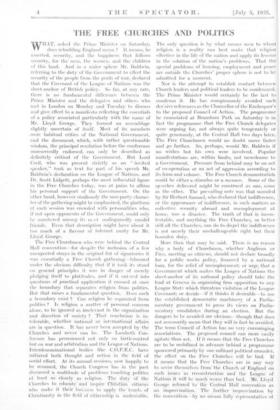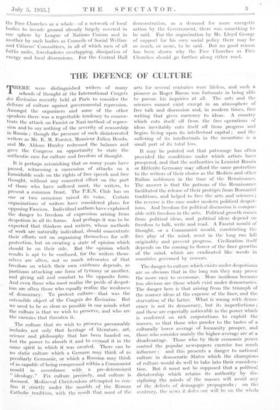THE FREE CHURCHES AND POLITICS
WHAT, asked the Prime Minister on Saturday, does rebuilding England mean ? It means, he asserted, security, and the happiness that follows security, for the men, the women, and the children of this land. And in a wider sphere Mr. Baldwin,, referring to the duty of the Government to effect the security of the people from the perils of war, declared that the Covenant of the League of Nations was the sheet-anchor of British policy. So far, at any rate, there is no fundamental difference between the Prime Minister and the delegates and others who met in London on Monday and Tuesday to discuss and give effect to a manifesto reflecting the essentials of a policy associated particularly with the name of Mr. Lloyd George. They formed an assemblage slightly uncertain of itself. Most of its members .were habitual critics of the National Government, and the document, which, with rather questionable wisdom, the principal resolution before the conference unreservedly endorsed, can only be described as definitely critical of the Government. But Lord Cecil, who was present strictly as an " invited speaker," took as text for part of his speech Mr. Baldwin's declaration on the League . of Nations, and Dr. Scott Lidgett, perhaps the most influential figure in the Free Churches today, was at pains to affirm his personal support of the Government. On the other hand, however studiously the non-party charac- terof the gathering might be emphasized, the platform at each session was crowded with personalities who, if not open opponents of the Government, could only be numbered among its nyyst undisguisedly candid friends. Even that description might ,have about it too much of a flavour of tolerant amity for Mr. Lloyd George.
The Free Churchmen who were behind the Central Hall convention—for despite the inclusion of a few unexpected strays in the original list of signatories it was essentially a Free Church gathering—laboured under the obvious difficulty that if it took its stand on general principles it was in danger of merely pledging itself to platitudes, and if it entered into questions of practical application it crossed at once the boundary that separates religion from politics. But that raises a fundamental question. Does such a boundary exist ? . Can religion be separated frail politics ? Is religion a matter of personal concern alone, to be ignored as irreleVant in the organization and direction of society ? ,That conchision-,is in- tolerable, whether national or international affairs are in question. It has never been accepted by the ChurcheS and never can be. The Lambeth Con- ference has pronounced not only on birtlicontrol but on war and arbitration and the League of Nations. Interdenominational bodies like C.O.P.E.C. have initiated both thought and action in the field of social effort. At its annual sessions, now happily to he resumed, the Church Congress has in the past discussed a multitude of problems touching politics at least as cloSely as religion. • The duty of the Churches to educate and inspire CliVistian citizens- who make it their bus:ness to apply the tenets of Christianity in the field of citizenship is undeniable. The only question is by what means men to whom religion is a reality can best make that religion effective in the life ,of the nation and apply its lessons in the solution of the nation's problemS. That the special problems of housing, employment and peace arc outside the Churches' proper sphere is not to be admitted for a moment.
Nor is the attempt to establish contact between Church leaders and political leaders to be condemned. The Prime Minister would certainly be the last to condemn it. He has conspicuously avoided such der:sive references as the Chancellor of the Exchequer's to the proposed Council of 'Action: The programme he enunciated at Bramham Park on Saturday is in fact the programme that the Free Church delegates were arguing for, not always quite temperately or quite generously, at the Central Hall two days later. The Free Churchmen would no doubt move faster and go farther. So, -perhaps, would Mr. Baldwin if no wishes but his own were involved. Popular manifestations are, "within limits, not unwelcome to a Government., Pressure from behind may be an act of co-operation or an act of aggression according to its form and volume. The Free Church demonstratioh could be either a stimulus or a menace. Some of the spzeches delivered might be construed as one, some as the other. The prevailing note was that sounded by Sir Herbert Samuel, who declared that indifference, or the appearance of indifference, in such matters as collective security abroad and unemployment at home, was a disaster. The truth of that is incon- testable, and anything the Free Churches, or better still all the Churches, can do to dispel the indifference is not merely their unchallengeable right but their bounden duty.
. More than that may be said. There .is no reason why a body of Churchmen, whether Anglican or Free, meeting .as citizens, should not declare broadly for a public works _policy, financed by a, national loan, for the relief of unemployment; or urge that a • Government which makes the League of Nations the sheet-anchor of its national policy should take the lead at Geneva in organizing firm opposition to any League State which threatens violation of the. League Covenant; or decide—if it thinks it desirable—to use the established democratic machinery of Parlia- mentary government to press its views on Parlia- mentary candidates during , an election. But the dangers to be avoided are obvious—though that does not necessarily mean that they will in fact be avoided. The term' Council of Action has no.very encouraging associations. The propoSed council can more easily agitate than act. Hit means that the Free Churches are to be mObilized in advanee behind a programme sponSored primarily by one militant pOlitical Crusader, the effect on the 'Free ChiireheS will be bad. If it means that the Free ChurcheS 'are in any way to sev'er thenriclves from' the Church:of England on such issues as reconstruetiOn 'and" the League of Nations it will be much worse than bad.,, Mr. Lloyd George referred to the Central Hall' convention as an improvization. The further —improvization by the convention--by non cans fully representaive.of the Free Churches as a whole—of a network of local bodies to invade ground already largely covered in one sphere by League of Nations Unions and in another by such bodies as Councils of Social Welfare and Citizens' Committees, in all of which men of all faiths unite, foreshadows overlapping, dissipation of energy and local dissensions. For the Central Hall demonstration, as a demand for more energetic action by, the Government, :there was something to be said. For the organization by Mr. Lloyd George of support for his own social policy there may be as much, or more, to be said. But no good reason has been shown why the Free Churches as Free Churches should go further along either road.















































 Previous page
Previous page